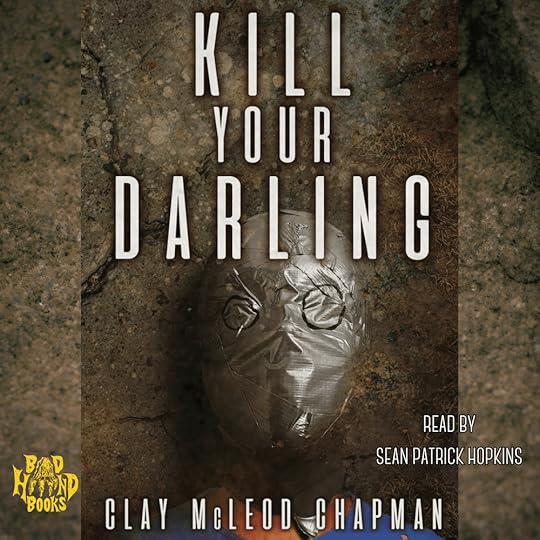Kill Your Darling by Clay McLeod Chapman [audiobook]

Fresh off his work as an ethereal voice on the other end of a disconnected phone in Stay on the Line, Sean Patrick Hopkins returns to narrate the hell out of another grief-laden horror novella from Clay McLeod Chapman in Kill Your Darling.
Glenn Partridge and wife lost their 15-year-old son to a brutal murderer 40 years ago. It’s a wound that won’t heal, can never heal. Glenn’s wife signs him up for a community writing workshop in the hopes that it’ll help get him a hobby, and get him out of her hair for a little while. Rather than distract him from the obsession of his son’s death, Glenn finds it an opportunity to tell their story, or, perhaps more importantly, to tell Billy’s story. Billy’s murder has been a cold case long enough for a long line of detectives to have retired and die, none of them ever getting any closer to solving the mystery. In telling Billy’s story and unraveling the past, Glenn hopes to find answers, but does he really want the truth?
Chapman is a hell of a writer. His words come from the gut as much as they do the heart, and he’s content to use them as knives to stab at readers with an assassin’s precision. Glenn’s in his 80s. His son has been dead longer than he ever had a chance to live, but his murder took away Glenn’s life, too. The man has gotten old, but it’s been a long, slow death since losing Billy. Whatever is left of him exists only in the hopes that there might be some resolution, some bit of closure. He calls the police daily asking if there’s been any new leads while studying the last shirt his son ever wore in the hopes of scrying a blood stain the forensics team missed all those years ago. He maintains a photo album documenting every inch Billy’s too-short 15 years. He’s given over his existence to become an eternal flame in tribute to Billy. He’s married, but it’s his dead boy that defines him.
Hopkins captures this all perfectly in his reading of Chapman’s material. There’s a rough hollowness to the words spoken that echo Glenn’s loss. We feel the grief, the emptiness, the anger, leeching into Hopkins performance throughout, and the ways hope compete against hopelessness. It’s an emphatic and, more importantly, empathetic reading.
Kill Your Darling forgoes the supernatural in favor of those all-too-personal real-life horrors. The horror of loss, of the brutal murder of a child whose head was encased in a mask of duct tape and suffocated, the horror of never knowing why it happened or who did it. There are no made-up monsters, no vampires or zombies to explain it all away for us. It’s all human, the kind of horrors Chad Lutzke or Jack Ketchum largely wrote about in their too-recognizable monsters that live next door. It’s the kind of horror Clint Eastwood might have adapted to film, starring and directing in between talking to an empty chair at conventions for fascists, back when he was riding high on Gran Torino or Mystic River, if only this book had come out 20 years ago. It’s the kind of horror that’s scary because of how realistic it is, rooted so firmly as it is in the possibility of loss and tragedy and the ease with which one can lose themselves to grief.



